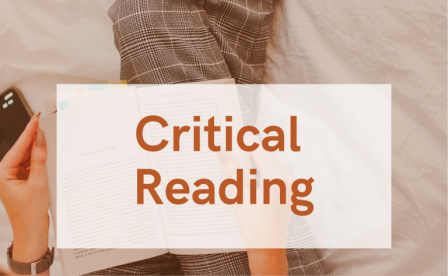Critical Reading : how to read critically
Duration: 3 mins 19 secs
Share this media item:
Embed this media item:
Embed this media item:
About this item
Transcript
Transcript:
How to read critically
When presented with a scholarly work, there are techniques you can use to ask yourself if you are reading critically. Try thinking about the purpose of the article and ask yourself, why has this been written? Also, think about why you've been asked to read it. If an academic sets that the reading, ask
‘Why did they do that?’ and if you found the resource yourself, think about the reason that you're reading it and what you were searching for us in the first place. Also, think about if the purpose is to disagree or agree with something or someone. Think about the context which the article sits in and what else is being written. Maybe you can identify other texts which relate to the article you are reading and also think about how this what changes what's been written before. And for doing this, you'll be able to identify the impact of what you’re reading. Ask yourself about the identity of the author or the main area of study and think about what makes this article stand out in its own right. So ask yourself, ‘what is the author saying?’, ‘What's unique about this argument’ and ‘how is the argument made?’
This will lead you to make your analysis of the documents and come up with your own ideas and opinions. This might be: ‘Do you agree with it?’ and ‘Is the main idea argued robustly enough?’. You will need to find and capture all this information while reading scholarly works and you can make this easier for yourself. Set up a system so you know what you are looking for. Organise your notes so that you can remember to highlight them and also record them in a way that makes it easier for you to find this information when completing your assignments. Start thinking about the best way to do this and making use of templates, colours, mind maps and apps.
When presented with a scholarly work, there are techniques you can use to ask yourself if you are reading critically. Try thinking about the purpose of the article and ask yourself, why has this been written? Also, think about why you've been asked to read it. If an academic sets that the reading, ask
‘Why did they do that?’ and if you found the resource yourself, think about the reason that you're reading it and what you were searching for us in the first place. Also, think about if the purpose is to disagree or agree with something or someone. Think about the context which the article sits in and what else is being written. Maybe you can identify other texts which relate to the article you are reading and also think about how this what changes what's been written before. And for doing this, you'll be able to identify the impact of what you’re reading. Ask yourself about the identity of the author or the main area of study and think about what makes this article stand out in its own right. So ask yourself, ‘what is the author saying?’, ‘What's unique about this argument’ and ‘how is the argument made?’
This will lead you to make your analysis of the documents and come up with your own ideas and opinions. This might be: ‘Do you agree with it?’ and ‘Is the main idea argued robustly enough?’. You will need to find and capture all this information while reading scholarly works and you can make this easier for yourself. Set up a system so you know what you are looking for. Organise your notes so that you can remember to highlight them and also record them in a way that makes it easier for you to find this information when completing your assignments. Start thinking about the best way to do this and making use of templates, colours, mind maps and apps.
Available Formats
| Format | Quality | Bitrate | Size | |||
|---|---|---|---|---|---|---|
| MPEG-4 Video | 640x360 | 197.5 kbits/sec | 4.80 MB | View | ||
| WebM | 640x360 | 176.94 kbits/sec | 4.32 MB | View | ||
| iPod Video | 480x360 | 188.69 kbits/sec | 4.58 MB | View | ||
| MP3 | 44100 Hz | 250.07 kbits/sec | 6.07 MB | Listen | ||
| Auto * | (Allows browser to choose a format it supports) | |||||


